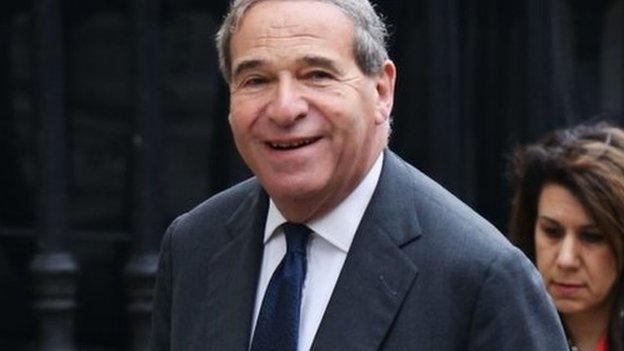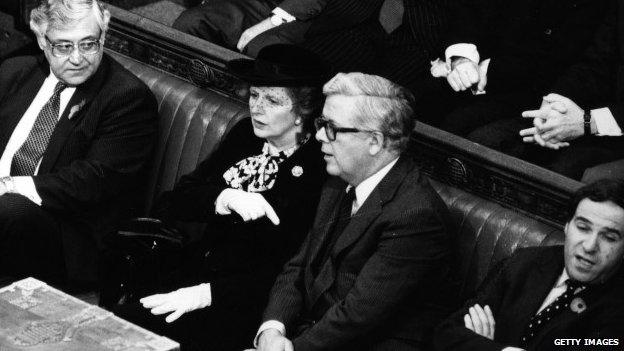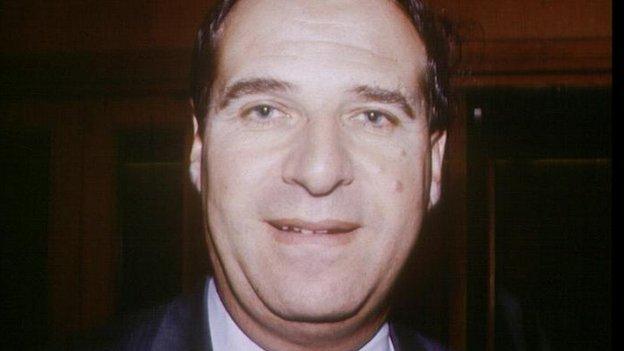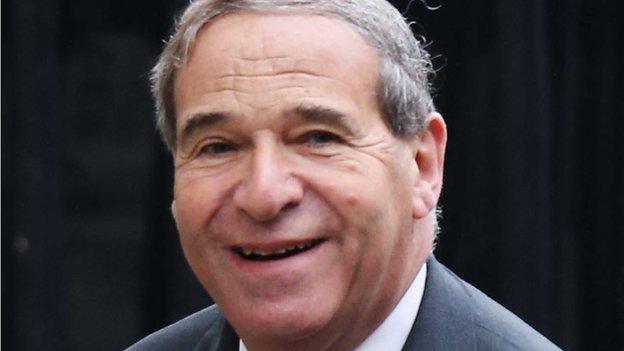Obituary: Leon Brittan
- Published

A former barrister, Leon Brittan rose quickly through the ranks to enjoy a high-profile and varied political career - cabinet minister, European commissioner and peer.
He was first elected to Parliament in 1974. By 1981, he was in Margaret Thatcher's cabinet and in 1983, became the youngest home secretary since Winston Churchill.
Like many home secretaries before and after, his tenure in the post proved stormy and difficult, with controversy about police action against striking miners, accusations of censorship over a BBC Real Lives programme about Northern Ireland, the Libyan embassy siege and a continuing rise in the crime rate.

Leon Brittan (right) served in Margaret Thatcher's cabinet between 1981 and 1986
In September 1985, he was moved - some said demoted - to the Department of Trade and Industry, where, less than five months later, his ministerial career fell apart when he resigned in the aftermath of the Westland affair.
A dedicated Europhile, he went on to spend a decade in Brussels as a European commissioner and was made a peer in 2000.
In recent years, he faced pressure to reveal what he knew about claims of paedophile rings operating at the heart of the British establishment.
Leon Brittan was born on 25 September 1939. Brought up in the orthodox Jewish tradition, he came from a middle-class north London home. His father, who had emigrated to Britain from Berlin, was a prosperous GP.
He began his education at a state school, winning a scholarship to Haberdashers' Aske's, and then, aged 16, an exhibition to Trinity College, Cambridge, to study English and law.
He joined the Tory party as a student, showing early political ambition as the president of the Cambridge Union and chairman of the university Conservative Association.
After leaving university, he was called to the Bar and enjoyed a lucrative career as a libel lawyer, becoming a QC in 1978.

Political career
1974 elected as Conservative MP
1979-81 Home Office minister
1981-83 chief secretary to the Treasury
1983-85 home secretary
1985-86 trade and industry secretary
1986 resigned over Westland affair
1989 resigned as MP to become a European commissioner, serving as European Commission vice-president between 1989 and 1993
2000 given a peerage, becoming Baron Brittan of Spennithorne

He was determined to make a career in politics and relentlessly pursued a parliamentary seat, finally winning Cleveland and Whitby in 1974. When his seat disappeared in the boundary changes, he became the member for nearby Richmond.
He married Diana Clemetson in 1980. She already had two children from a previous marriage.
Mr Brittan's cabinet career came to a dramatic end during the Westland affair when he was trade and industry secretary.
After the Westland helicopter firm got into difficulties, there was a heated dispute within the cabinet over whether the Somerset-based company should link up with an American or European backer.
The Defence Secretary, Michael Heseltine, wanted a link-up with Europe. Mr Brittan and a majority of the cabinet wanted Westland to join up with the US company Sikorski.
Mr Brittan authorised the leaking of a letter from the solicitor general that accused Mr Heseltine of inaccuracies in his campaign. Tory MPs demanded that Mr Brittan should resign over the leak, and he did so, saying he had lost the confidence of his colleagues.

Leon Brittan was home secretary between 1983 and 1985
On the back benches, Mr Brittan spoke out on various issues - notably calling for sanctions against South Africa, despite Mrs Thatcher's opposition to them.
A prominent Europhile throughout his career, he resigned as an MP in 1989 to become a European commissioner, serving as vice-president of the commission for four years.
It was Leon Brittan who gave the now Liberal Democrat leader Nick Clegg his introduction to politics, employing him as an office aide when he was a trade commissioner in Brussels.
Leon Brittan was knighted and given a peerage in the New Year's Honours for 2000.
He took up positions in business, serving as vice-chairman of the UBS investment bank. He was also a trade adviser to Prime Minister David Cameron after the coalition government was formed in 2010.
In recent years, Lord Brittan came under pressure to make public what he knew about allegations of paedophiles operating in Westminster in the 1980s.
Lord Brittan confirmed that when he was home secretary, he had received a dossier from the late Conservative MP Geoffrey Dickens. He insisted he had passed it to Home Office officials for proper examination.
An internal review published in 2013 found that he had acted appropriately.
Last year, it was reported that Lord Brittan had been interviewed by police over a historical allegation of rape.
He said: "I have been questioned by the police about a serious allegation made against me. This allegation is wholly without foundation."
Lord Brittan is survived by his widow and two stepdaughters.
- Published22 January 2015
